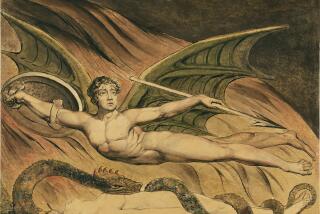Rights Leader and Ecumenist E. C. Blake Dies
- Share via
The Rev. Eugene Carson Blake, architect of the ecumenical movement in America and a minister so influential that he was half-jestingly called the “Protestant Pope” when he was the general secretary of the World Council of Churches from 1966 to 1972, died Wednesday in Stamford, Conn., at age 78.
Blake had been hospitalized since mid-July and died from complications resulting from diabetes, according to a National Council of Churches spokesman.
The square-jawed, broad-shouldered minister played football at Princeton University, where he earned his doctorate in theology. He taught for a year at Forman Christian College in Lahore, India, and at a Presbyterian church in Albany, N.Y.
He began his rapid rise as a Protestant leader after serving as pastor at Pasadena Presbyterian Church from 1940 to 1951.
In 1951 he was elected the stated clerk or chief executive of the United Presbyterian Church. In 15 years he had converted that post from a relatively obscure administrative position to one of great influence in the broader Protestant world.
He also was president of the National Council of Churches from 1954 to 1957.
Blake launched the modern ecumenical effort with a sermon he preached in December, 1960, at Grace Episcopal Cathedral in San Francisco calling for union among Christian churches, starting with the Presbyterians and four other denominations. The call developed into the ongoing Consultation for Church Union, a group that has had as many as 10 denominations exploring closer ties and church unity.
Blake’s sermon was set in the context of the 1960 presidential election won by Roman Catholic John F. Kennedy after a campaign marred by often acrimonious religious debates.
‘Competing Social Groups’
Churches “cannot afford longer the luxury of our historic divisions,” Blake said from the pulpit. “Americans, more than ever, see the churches of Jesus Christ as competing social groups, pulling and hauling, propagandizing and pressuring for their own organizational advantages.”
During a period when mainline Protestant churches were prospering and well-attended but also predominantly white in membership, Blake was credited with persuading churchgoers to change their thinking and become involved in social-political change.
He said at a rally at his former Pasadena church in 1963 that “Arcadia, San Marino and South Pasadena say, ‘We have no race problem,’ and I say their basic problem is that they have lily-white communities and the need is to open them up.”
During the early days of the civil rights struggle, a widely distributed news photograph showed Blake under arrest and being loaded into a paddy wagon for defying segregation rules in Baltimore.
In 1966, Blake resigned his U.S. Presbyterian post to become general secretary of the World Council of Churches, the Geneva-based organization then with 250 Protestant, Anglican and Eastern Orthodox member churches. He met several times with Pope Paul VI and other world religious leaders and advocated an activist Christian role on matters of social justice even as conservative church members back in America increased their criticisms of the world council’s liberal bent.
‘Controversial . . . Prophet’
By the time Blake was succeeded in his general secretary post by Jamaican clergyman Philip Potter in 1972, he was voicing opposition to continued American fighting in Vietnam and defending controversial World Council grants to black liberation movements in southern Africa.
When Blake returned to the United States in 1973, he ran for the primarily honorary one-year post of moderator of the United Presbyterian Church and finished embarrassingly last in a field of five candidates. One clergyman suggested that Blake had been “too controversial a prophet.” In addition, the church unity movement Blake was so closely identified with had hit the doldrums in the 1970s before interest resurged in the 1980s.
Undaunted, Blake served several years as head of Bread for the World, an anti-hunger advocacy project also involving some congressmen. By then he had moved to Connecticut, where he lived in semi-retirement and married Jean Ware Hoyt.
The Rev. Arie Brouwer, general secretary of the National Council of Churches, said Blake played a “decisive and vigorous role” in U.S. churches at the peak of his ministry: “The history of the American churches in the 20th Century was profoundly influenced by Eugene Carson Blake.”
More to Read
Sign up for Essential California
The most important California stories and recommendations in your inbox every morning.
You may occasionally receive promotional content from the Los Angeles Times.













